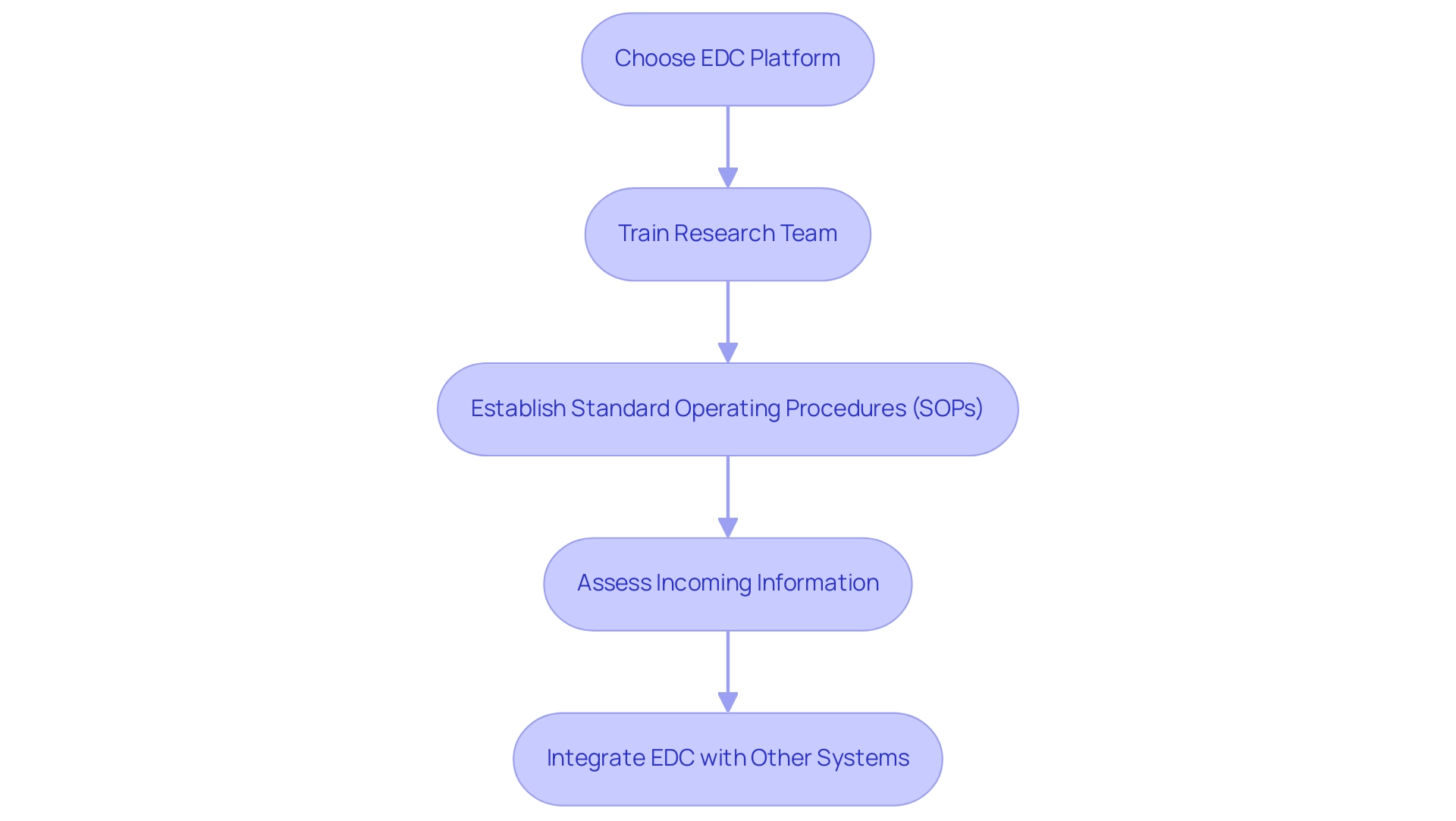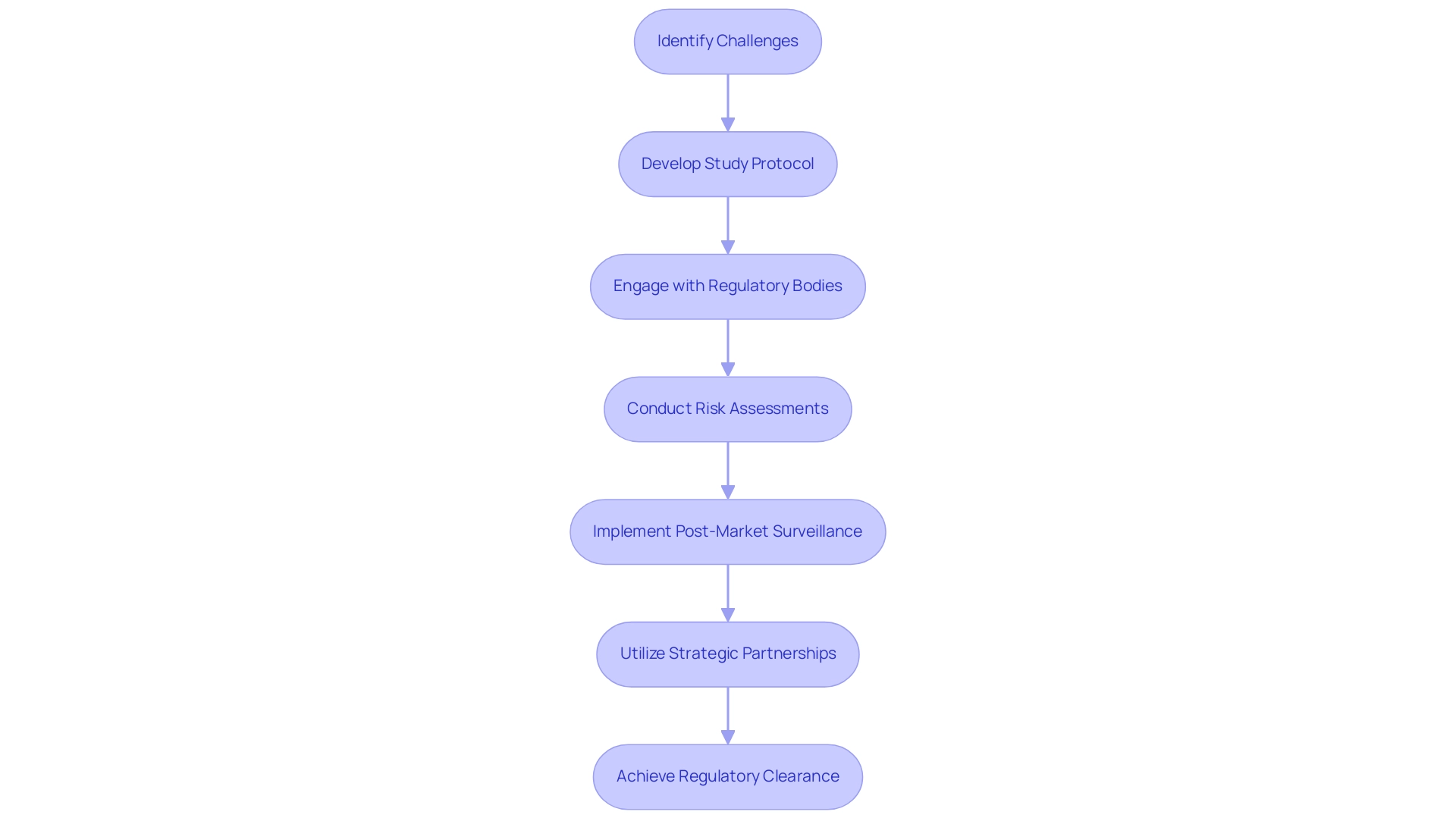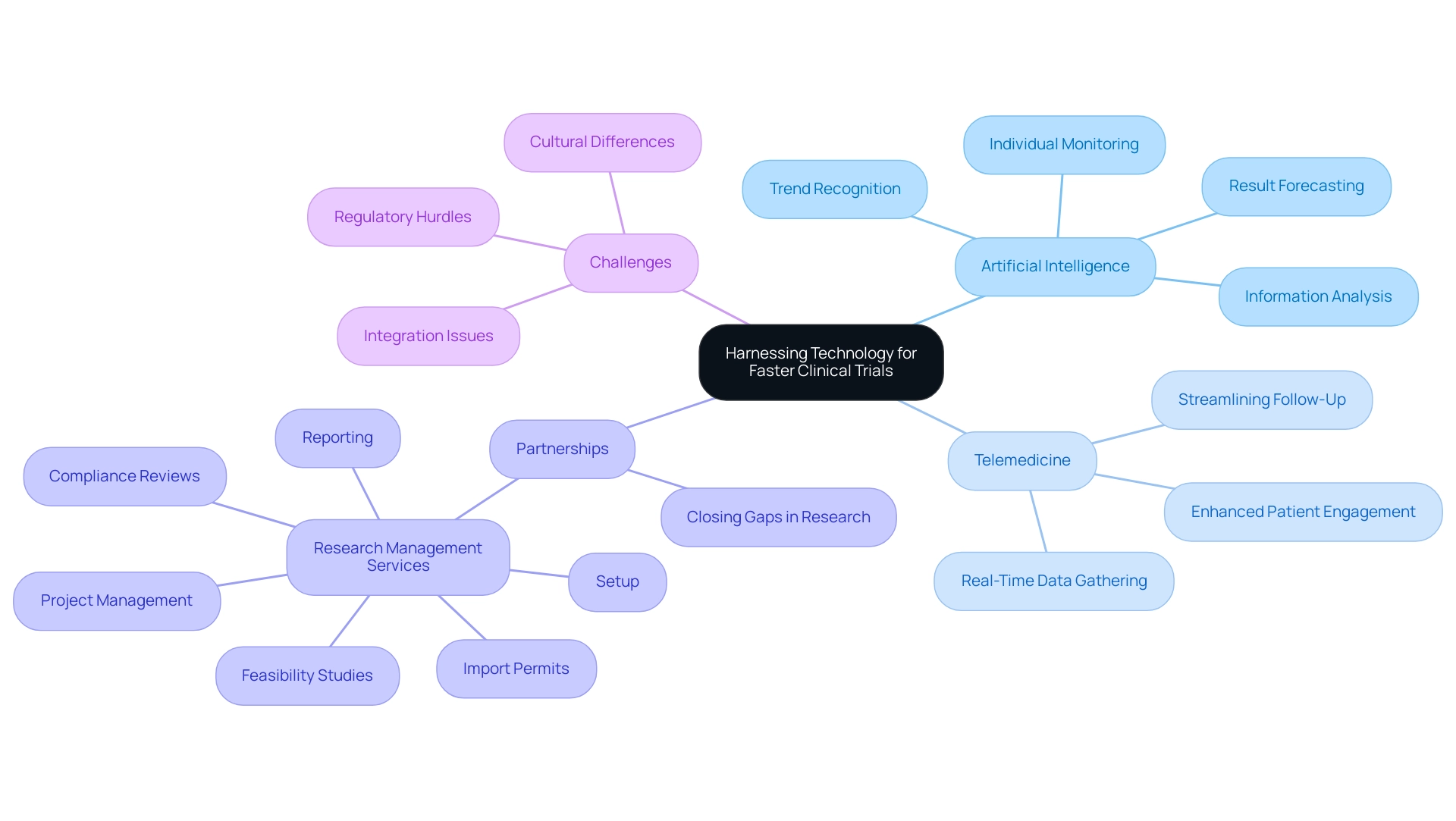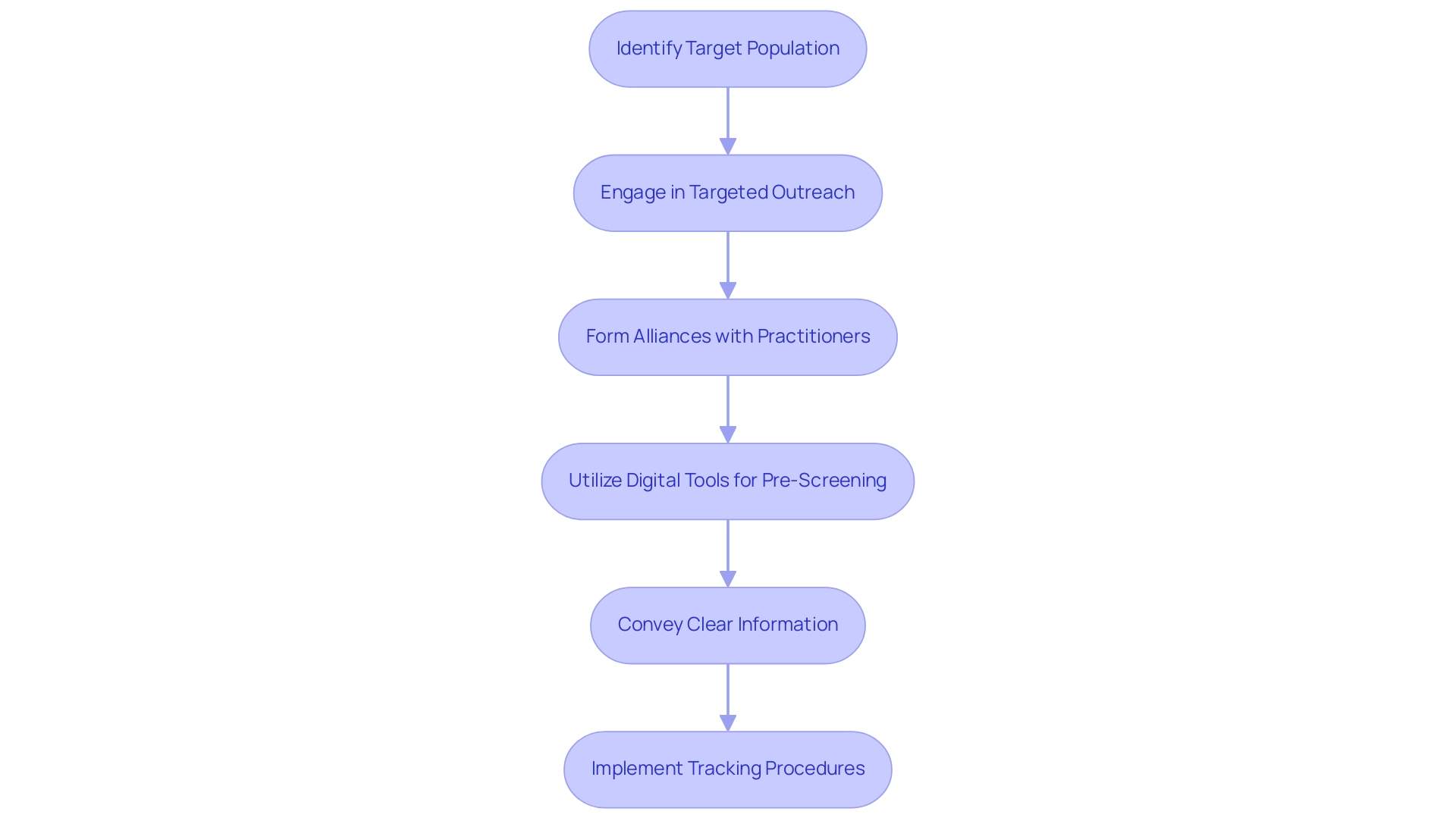Introduction
In the rapidly evolving landscape of clinical trials, the integration of innovative strategies and technologies is paramount for success. As organizations strive to enhance efficiency and streamline processes, the adoption of electronic data capture (EDC) systems, coupled with a thorough understanding of regulatory pathways, emerges as a critical focus. This article delves into the multifaceted approaches that can be employed to accelerate clinical trials, from leveraging advanced technologies like artificial intelligence to implementing effective patient recruitment strategies.
By examining the unique challenges faced in medical device trials and exploring best practices for navigating regulatory requirements, stakeholders can better position themselves to achieve timely and successful outcomes in their clinical research endeavors.
Leveraging Electronic Data Capture (EDC) to Accelerate Clinical Trials
To effectively utilize electronic information capture (EDC) in your clinical studies, start by choosing a strong EDC platform that aligns seamlessly with your study requirements. Look for a system that offers impressive flexibility, allowing for customization with 21 different field types, as noted by Elena Allen from Rodin Scientific, who states, 'Impressive flexibility, ability to customize forms with (almost) any imaginable feature/data flow.' This flexibility is crucial as it supports real-time information entry and monitoring, ensuring immediate access to critical details essential for speeding up clinical trials for medical devices.
It's also crucial to train your research team thoroughly on the EDC system to minimize errors and enhance information quality. Establish standard operating procedures (SOPs) for information entry and validation to streamline processes further. Frequently assessing and examining incoming information allows for faster modifications to the study protocol if needed, improving responsiveness to changing research requirements.
Significantly, platforms such as Castor EDC enable the integration of trial information from devices, electronic health records (EHRs), and other sources, permitting straightforward mid-study form modification to accommodate protocol changes. This ability is demonstrated by the Centralized Clinical Information System, which combines information from various sources into a single platform, enhancing management and adaptability in research studies. By integrating EDC effectively, you can significantly reduce data collection time and enhance overall study efficiency, which plays a crucial role in speeding up clinical trials for medical devices, as evidenced by successful outcomes in centralized data systems.

Understanding the Unique Challenges of Medical Device Clinical Trials
Navigating the landscape of medical device clinical studies requires a thorough understanding of the complex regulatory pathways and extensive pre-market evaluations involved. Medical device startups face significant challenges, including:
- Convoluted regulatory hurdles
- Competition from established players
- Recruitment issues
- Limited financial resources
A notable challenge arises from the necessity for comprehensive device testing to establish safety and efficacy, often resulting in prolonged timelines.
For instance, GlobalCare Clinical Trials recently partnered with bioaccess™ to enhance its ambulatory services in Colombia, achieving over a 50% reduction in recruitment time and a 95% retention rate. Such strategic partnerships are essential for startups seeking to overcome recruitment barriers and are crucial for speeding up clinical trials for medical devices. Additionally, IDx Technologies has chosen bioaccess™ for data-licensing collaboration in Latin America, enhancing patient access to AI-driven disease detection in ophthalmology.
This emphasizes the significance of utilizing existing networks to enable trials effectively. Notably, almost half of the new medical devices referenced in the literature ultimately achieve regulatory clearance or approval. Moreover, 90% of published clinical studies of devices that received regulatory clearance or approval were case series, underscoring the commonality of this study type.
The variability in device functionality across diverse patient populations complicates recruitment efforts and analysis. As highlighted by Gail A. Van Norman, 'For investigators seeking approval for new drugs and devices, FDA processes can be formidable.'
To effectively address these challenges, it is crucial to develop a clear study protocol that meets the specific requirements for speeding up clinical trials for medical devices, including:
- Risk assessments
- Post-market surveillance plans
Engaging in close collaboration with regulatory bodies early in the design phase can facilitate alignment on expectations and requirements, ultimately streamlining the approval process. Recent data indicates that the most common regulatory pathway is the 510(k) clearance, with 79% of approved devices deemed 'substantially equivalent' to existing devices.
Moreover, 43% of these devices were cleared or approved before the release of their research studies, highlighting the significance of strategic planning in study timelines. The IDEAL model, introduced within the regulatory approval framework, emphasizes the importance of randomized controlled studies to guarantee a more organized introduction of innovations. By concentrating on feasibility and choice of research locations, investigator selection, and thorough reporting on study status, startups can better manage the intricacies of studies and improve their chances of success.

Harnessing Technology for Faster Clinical Trials
To efficiently utilize technology for speeding up medical studies, it is crucial to incorporate sophisticated instruments like artificial intelligence (AI) for both information analysis and individual monitoring. AI not only aids in recognizing trends among individuals but also forecasts results with greater speed and precision compared to conventional methods. Significantly, medical trials can now be carried out entirely online, removing the necessity for face-to-face interactions and enabling real-time data gathering through digital platforms focused on remote monitoring.
This shift significantly reduces the reliance on physical visits and enhances patient engagement, particularly in regions like Latin America, where innovative medical solutions are becoming increasingly accessible. As Andrea Coravos, CEO of Elektra Labs, states, 'The transformative potential of these technologies cannot be overstated; they are reshaping how we conduct research and engage with participants.' Moreover, the partnership between Greenlight Guru and bioaccess™ is essential in closing gaps in medical research, ensuring that Medtech companies can maneuver through the challenges of studies in Latin America.
This partnership improves thorough research management services, including:
- feasibility studies
- setup
- compliance reviews
- import permits
- project management
- reporting
Implementing telemedicine solutions can streamline follow-up procedures, ensuring timely communication with participants. However, challenges remain in the integration of these digital technologies, particularly regarding regulatory hurdles and cultural differences that Medtech companies must navigate.
Careful planning is crucial to overcome these barriers. The incorporation of electronic health records (EHRs) provides a strong structure for accessing extensive individual data, ensuring that studies are directed by the most current health information. By embracing these technological advancements, alongside comprehensive trial management services, clinical research teams can not only address existing challenges but also dramatically enhance the efficiency and inclusivity of their trials, ultimately contributing to speeding up clinical trials for medical devices.

Effective Patient Recruitment Strategies to Expedite Trials
To expedite recruitment effectively, it is crucial to begin with a precise identification of the target population. Engaging in targeted outreach through social media platforms and registries can significantly enhance your ability to locate potential participants who align with your study criteria. With 2,213 individuals having dental insurance, leveraging this statistic can provide a quantitative aspect that supports your recruitment efforts.
Forming alliances with healthcare practitioners and advocacy organizations is another essential tactic, as it enhances visibility and cultivates trust in your clinical study. Key considerations for recruiting and retaining young women in nutrition research studies should also be taken into account, as they can broaden the scope of recruitment strategies. Utilizing digital tools for pre-screening candidates not only simplifies the recruitment process but also guarantees that only qualified individuals are contacted, thereby optimizing resources.
Moreover, it is crucial to convey clear and compelling information about the benefits and commitments, which can encourage participation. As Meri Beckwith, Co-Founder, aptly states,
By empowering individuals with tools that enhance their experience, researchers can cultivate a more informed and involved participant base.
Implementing these strategies can effectively reduce recruitment timelines and expedite the overall testing process, which is essential for speeding up clinical trials for medical devices.
Additionally, the Network's phased approach for practitioner recruitment emphasizes the importance of clear communication and tracking procedures, which can further enhance patient engagement, as seen in the recent case study on the feasibility and acceptance of oral HPV detection in dental offices, which demonstrated successful patient engagement through strategic outreach.

Navigating Regulatory Pathways to Accelerate Clinical Trials
Effectively navigating regulatory pathways for medical device studies requires a thorough understanding of specific requirements established by authorities such as the FDA and the European Medicines Agency (EMA). A well-structured regulatory strategy is essential, incorporating clear timelines for submission and anticipated feedback. All research study applications must be submitted online through the PRISM system, and any technical issues can be reported to the HSA helpdesk for prompt assistance.
Collaborating with regulatory consultants or legal specialists early in the process is essential; their knowledge can assist in identifying potential obstacles and ensuring that all required documentation is prepared correctly.
Our extensive research project management services include:
- Feasibility and selection of research locations and principal investigators (PI)
- Review and feedback on study documents to meet country requirements
- Compliance evaluations
- Project setup
- Initiation
- Import permits
- Ongoing project oversight and reporting
Consistent communication with regulatory organizations is essential to remain updated on any changes or modifications in regulations that could affect your study. The Multicenter & Strategic Collaborations Office also plays a key role in supporting the planning, activation, and management of multicenter research studies, enhancing collaborative efforts.
For example, the standard turnaround time for a Clinical Trial Application (CTA) is 30 working days, while Phase 1 studies may anticipate a quicker response in just 15 working days. By adopting a proactive approach to regulatory compliance, including adherence to the compliance process outlined in case studies, you can significantly reduce delays, thus contributing to speeding up clinical trials for medical devices and ensuring your trial remains on schedule while meeting all regulatory standards.
Katherine Ruiz, our Regulatory Affairs Expert, brings invaluable experience, having advised numerous foreign manufacturers on obtaining market clearance for their innovations in Colombia, ensuring a robust foundation for your clinical research initiatives, including detailed reporting on study status, inventory, and both serious and non-serious adverse events.

Conclusion
The integration of electronic data capture (EDC) systems is transforming clinical trials by enhancing efficiency and flexibility. Selecting robust EDC platforms and training research teams effectively streamline data management and improve data quality, enabling real-time adjustments to meet evolving trial needs.
Medical device trials face unique challenges, including complex regulatory pathways and extensive pre-market evaluations. Strategic partnerships and a clear understanding of regulatory requirements are crucial for overcoming recruitment hurdles and expediting processes, ultimately leading to timely outcomes.
Advanced technologies such as artificial intelligence and telemedicine play a vital role in accelerating clinical trials. These innovations enhance data analysis and patient monitoring, allowing for virtual trials that increase patient engagement and address existing challenges.
Effective patient recruitment strategies are essential for expediting trials. Identifying target populations and utilizing digital outreach tools optimize recruitment efforts, while clear communication of trial benefits builds trust and encourages participation.
Navigating regulatory pathways with a structured strategy and proactive compliance is key to timely trial execution. Early engagement with regulatory experts ensures accurate documentation and helps mitigate potential challenges.
In summary, the successful acceleration of clinical trials depends on integrating technology, effective recruitment strategies, and a thorough understanding of regulatory requirements. By adopting these multifaceted approaches, stakeholders can significantly enhance their chances of achieving timely and successful clinical research outcomes.
Frequently Asked Questions
What is the first step to effectively utilize electronic information capture (EDC) in clinical studies?
The first step is to choose a strong EDC platform that aligns with your study requirements, ensuring it offers flexibility and customization options.
Why is flexibility important in an EDC system?
Flexibility is crucial as it allows for customization with various field types, supporting real-time information entry and monitoring, which is essential for speeding up clinical trials.
What should be done to minimize errors when using an EDC system?
It is important to train the research team thoroughly on the EDC system and establish standard operating procedures (SOPs) for information entry and validation.
How can regular assessments of incoming information benefit a clinical study?
Regular assessments allow for faster modifications to the study protocol if needed, improving responsiveness to changing research requirements.
What advantage does the Castor EDC platform provide?
Castor EDC enables the integration of trial information from various sources, allowing for straightforward mid-study form modifications to accommodate protocol changes.
What role does the Centralized Clinical Information System play in research studies?
It combines information from different sources into a single platform, enhancing management and adaptability in research studies.
What challenges do medical device startups face in clinical studies?
Startups face convoluted regulatory hurdles, competition from established players, recruitment issues, and limited financial resources.
How can strategic partnerships assist in overcoming recruitment barriers?
Partnerships can enhance ambulatory services and improve recruitment and retention rates, as demonstrated by GlobalCare Clinical Trials' collaboration with bioaccess™.
What is the significance of clear study protocols in clinical trials?
Clear study protocols that meet specific requirements, including risk assessments and post-market surveillance plans, are crucial for speeding up clinical trials for medical devices.
What is the most common regulatory pathway for medical devices?
The most common regulatory pathway is the 510(k) clearance, with a majority of approved devices deemed 'substantially equivalent' to existing devices.
How can technology like artificial intelligence (AI) enhance clinical trials?
AI aids in recognizing trends and forecasting results quickly and accurately, allowing trials to be conducted entirely online and improving patient engagement.
What strategies can be employed to effectively expedite recruitment for clinical studies?
Strategies include precise identification of the target population, targeted outreach through social media, forming alliances with healthcare practitioners, and utilizing digital tools for pre-screening candidates.
Why is early collaboration with regulatory bodies important?
Early collaboration helps align expectations and requirements, ultimately streamlining the approval process for clinical studies.
What services do research project management teams typically provide?
Services include feasibility studies, compliance evaluations, project setup, initiation, and ongoing project oversight and reporting.

